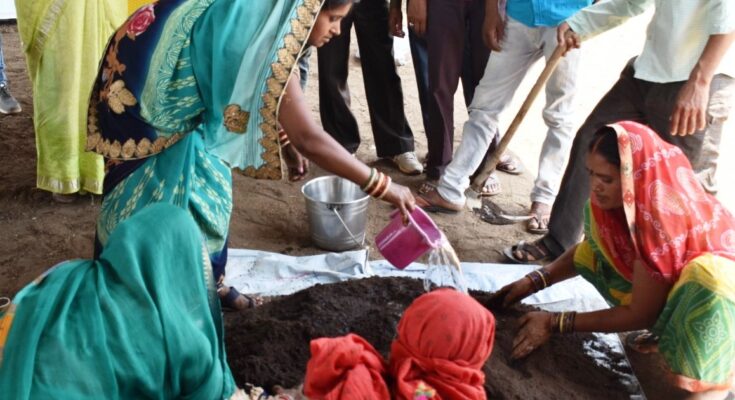Organic culture is increasing the amount of nitrogen, phosphorus, potash and zinc
Training being given to Gauthan committees by Agricultural University and Biotech Promotion Society
Raipur, August 08, 2022 
Gothans are being established in the entire state under the Godhan Nyay Yojana, which is being run by the Chhattisgarh government to promote organic farming and discourage chemical agriculture. In these Gauthans, vermicompost and supercompost are being made from cow dung, which is reducing dependence on chemical fertilizers in agriculture, improving soil health and increasing fertility. With the joint effort of Indira Gandhi Agricultural University and Chhattisgarh Biotechnology Promotion Society, a liquid organic culture named Urvara Shakti containing effective friendly micro-organisms has been prepared to increase the amount of nutrients naturally in vermicompost, supercompost made in Gauthans. Which is being used for quality upgradation and enrichment of supercompost and vermicompost made in Gauthans. In order to provide training on the use of bio-fertilizers, training programs are being organized in Gauthans in collaboration with 27 Krishi Vigyan Kendras of the state, in which members of Gauthan committees as well as members of women’s self-help groups are also participating. . Through this training program 1500 members of Gauthan Samiti and members of self-help groups have been trained from 150 Gauthans of the state.
The biofertilizers manufactured by Indira Gandhi Agricultural University and Chhattisgarh Biotechnology Promotion Society include Rhizobium culture, Phosphorus solubilizing bacteria culture, Azospirillum, Zinc solubilizing bacteria culture and Potassium solubilizing bacteria culture. Since manure made in Gauthan is a natural material, it is the best organic fertilizer for agriculture from environmental point of view. It is very useful for making the soil biologically rich along with nutrients. If effective beneficial microorganisms are included in these fertilizers keeping in view the local crop requirements, then their quality will increase. D.A.P. by the scientists of Agricultural University And keeping in view the requirements and fulfillment of Murate of Potash, PSBs are introduced in various crops. and K.S.B. Use of organic fertilizers is being advised. If the organic manures produced in the Gothans are bio-enriched with the above mentioned bio-fertilizers, the required nutrients can be supplied to the crops in sufficient quantity from the sphur and potash supplied by them. PSB About 15-20 kg/ha of Spher (C2V5) can be supplied to the crop using culture treated organic manures. Similarly, K.S.B. 12-15 kg of potash (K22) can be supplied per hectare using culture treated organic manure. At present, zinc deficiency has been found in paddy cultivation in some areas of the state, due to which the production of paddy is badly affected. Zinc dissolving bacteria (Z.S.B.) ) liquid culture can be used. Maize is cultivated in a large area of Bastar, in which potash plays an important role in increasing the production. Use of organic manure treated with Potash Dissolving Bacteria (KSB) culture for maize crop grown in light soils will undoubtedly prove useful for good yield of maize.
Indira Gandhi Agricultural University has recommended for the use of bio-infused organic manure for various crops, under which Azospirillum, PSB, Z.S.B. The use of organic manure has been recommended, Rhizobium, PSB in soybean, tur, moong, urad, gram, tiwda, kulthi and lentil crops. Culture organic manure can be used. Azospirillum, PSB in mustard, sesame and sunflower crops. The use of organic manure is recommended. Azotobacter, PSB in wheat, linseed and safflower crops. The use of organic manure is recommended. Similarly, Azotobacter, PSB, KSB, Kodo in maize crop and Azotobacter, PSB, ZSB in Kutki crop, Azospirillum, PS in Ragi crop. .b and Azotobacter, PSB, Z, SB, KSB in vegetable, fruit, flower. The use of organic manure is recommended.
Method of organic promotion of vermicompost, cow dung and other organic fertilizers:
- After the preparation of vermicompost or other organic manure, when it has 25-30 percent moisture in it, sieve it through a sieve.
- Treat the organic manure obtained after filtering through a sieve with a solution of organic fertilizer as follows:
1. Mix 1 quintal of vermicompost or other organic manure with 1 liter of liquid organic fertilizer or 1 kg. Treat with powder biofertilizer.
2. For treatment, apply 1 liter of liquid organic fertilizer or 1 kg of powdered organic fertilizer. Dissolve the quantity in 5 liters of water and sprinkle it in 1 quintal of vermi compost or organic manure and mix well.
3. At the time of mixing organic fertilizers, keep in mind that so much water should be mixed with organic fertilizer solution in vermicompost or organic manure that the moisture content in it reaches about 40 percent.
4. Cover the treated vermicompost with jute bags or para and leave it for 7-10 days to cool and grow under shade.
5. After processing, store the prepared vermicompost in a plastic sack and store it in a cool place.




